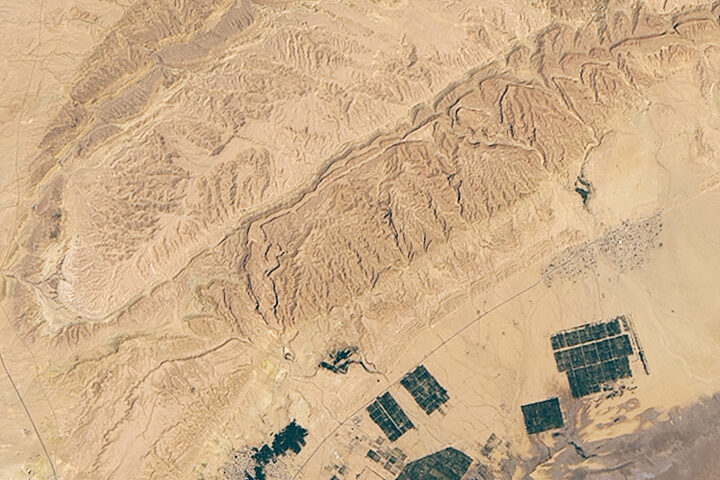
Every month on Earth Matters, we offer a puzzling satellite image. The May 2020 puzzler is above. Your challenge is to use the comments section to tell us what we are looking at, where it is, and why it is interesting.
How to answer. You can use a few words or several paragraphs. You might simply tell us the location, or you can dig deeper and explain what satellite and instrument produced the image, what spectral bands were used to create it, or what is compelling about some obscure feature. If you think something is interesting or noteworthy, tell us about it.
The prize. We cannot offer prize money or a trip to Mars, but we can promise you credit and glory. Well, maybe just credit. Roughly one week after a puzzler image appears on this blog, we will post an annotated and captioned version as our Image of the Day. After we post the answer, we will acknowledge the first person to correctly identify the image at the bottom of this blog post. We also may recognize readers who offer the most interesting tidbits of information about the geological, meteorological, or human processes that have shaped the landscape. Please include your preferred name or alias with your comment. If you work for or attend an institution that you would like to recognize, please mention that as well.
Recent winners. If you’ve won the puzzler in the past few months, or if you work in geospatial imaging, please hold your answer for at least a day to give less experienced readers a chance.
Releasing Comments. Savvy readers have solved some puzzlers after a few minutes. To give more people a chance, we may wait 24 to 48 hours before posting comments. Good luck!
See “In a Desert Not So Far Away for the Answer” Image of the Day for the answer. Congratulations to Dan O’Brien for being the first reader to post the answer on the Earth Matters blog.
Tags: puzzler




My guess is that a dust storm Hit a small town in colorado desert.
Parese un campamento militar el citio o localidad es como un decierto
Looks like the Carrizo plain
Nope, but we do have a wildflower-filled shot of the Carrizo Plain here: https://earthobservatory.nasa.gov/images/144709/wildflowers-on-the-carrizo-plain
I see at least one fault. Because it is a dry environment (no vegetation unless it includes irrigation), I wonder about the features over to the right on the image. Looks like it could be a town? Can’t tell. Another interesting piece of imagery is just above it in the photo. Now if that’s a dam, and behind that is a fault, it could spell trouble for the settlement, if that is what it is.
These are oases of dates palms on river terraces (very old oasis of Dgoumes and Tezrarit) . The irrigation system is rather fed by natural springs for old oasis or and wells for modern oasis in the south of the image (geometric forms)
Sidi Bouhlel in Tunisia, otherwise known as Star Wars Canyon, was the setting for the Tattoine scenes from the Star Wars film, and also where the scene featuring the opening of the Ark of the Covenant was filmed for Raiders of the Lost Ark. As it’s now a tourist attraction, a car park (parking lot) may be seen near the entrance to the canyon, as long as you have keen eyes.
So…I won…?
You did! Nicely done. Have you been there?
Sadly I’ve never had the pleasure. I was just channeling my inner geologist from when I used to be one.
Possibly this is near Al-Ain, site of iron age qanats that are the oldest known?
Interesting guess. It wasn’t Al-Ain, but we do have a story that highlights some of the greening efforts that have happened there in recent decades. https://earthobservatory.nasa.gov/images/86521/the-greening-of-al-ain
I had forgotten that Al-Ain has the world’s oldest qanat system. Do you happen to have a map of the location of the qanats or know if any of them are visible at Landsat resolution? I haven’t had a chance to check on that yet.
I thought it was pretty great that we could see a qanat system in Morocco. Take a look: https://earthobservatory.nasa.gov/images/89133/ancient-waterways-in-morocco
And if you’re interested in space archaeology, check out these stories:
https://earthobservatory.nasa.gov/features/SpaceArchaeology
https://earthobservatory.nasa.gov/blogs/eokids/space-archaeology-uncovering-the-past/
A town in the desert
Looks a lot like part of Libya’s Great Man-Made River project.
It reminds me of the area around Petra in Jordan.
Sidi Bouhlel, close to chott-el-Djeride, a salt pan in the start of the Sahara, Tunisia.
What is interesting? a lot of thing.
Canyon of Sidi Bouhlel, Tozeur, SW desert of Tunisia, North Africa. It is located in the Gafsa-fault corridor, the one of the most beautiful geological landscape and oasis palm in the world.
Location: Sidi Bouhlel, Tozeur, Tunisia | Coordinates: 34°01’55.1″N 8°16’55.3″E | Description: An interesting part of a true color Satellite Image acquired with Landsat 8 OLI that shows the top view of a classic Geological Anticlinal fold formation at the edge of the northern Sahara Desert. It is an Oasis and a Ravine which is a popular tourist destination commonly known as the “Star Wars Canyon” because some of the movie scenes where shot here. ‘This place is named after a shrine built to honor a holy man (marabout) of the same name’. The south and south-east sections of the satellite image depicts rows of Palm Tree plantation in green. The long linear feature running south and east of the image is actually the main road passing through the El Mahassen human settlement in the east.
A large asymmetrical anticline dipping to the SW. At least 2, maybe 3 faults on the steeper dipping north slope. 2 small dams supply water to a small town to the east and to small farms in the south. The SE corner could be a volcanic plateau. I would hazard a guess at the Qilian Shan region of China.
judean or negev desert. two major roads in an arid region indicate that this is a first world country(israel).
baja california
Shandong, China.
Solar panel highway.
Probably produced through NASA’s Multi-angle Imaging SpectroRadiometer (MISR).
Shams solar power plant in the western region, abu dhabi.
well
it looks like high desert California
run off from flash floods in the dirt
agriculture/farming going on sq patch
I say Lancaster…CA area
I am certain it is African Deserts. Most likely Tunisia. But I would not disregard Libya or Algeria.
I’m sure that’s Dghoumes National Park in Tunisia, where parts of Star Wars was filmed